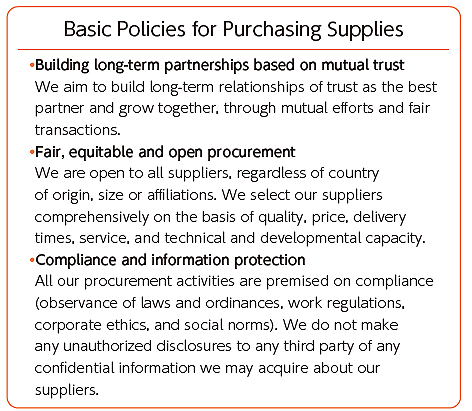Suppliers
We have established basic policies on procurement, and we encourage green procurement according to our own guidelines.
Basic procurement policies
We have established three basic principles in procurement: building long-term partnerships based on mutual trust; fair, equitable and open procurement; and compliance and maintaining confidentiality. Although we have been proceeding consultations with our suppliers online and Web procurements, due to digital transformation promotion during the COVID-19 pandemic, our three Basic Policies for Purchasing Supplies have not changed.

NHK Spring Group CSR Procurement Guideline
Recent social trends expect companies to strengthen their activities on social responsibility as a company (CSR), triggered by corporate scandals, employment and labor issues becoming more obvious due to financial crisis, and environmental issues. Therein, we ask all of our partners to understand our CSR activities and strive to fulfill CSR not only at NHK Spring but also throughout the entire supply chain. In 2014, we formulated the CSR Procurement Guideline as part of these activities which appear in Japanese, English, Chinese, and Thai on our website. In addition, a survey for more than 1,000 suppliers covering CSR Procurement Guideline content is administered annually. Survey items span a diverse range of topics including compliance, risk management (BCP), human rights, labor, and the environment.
 Survey subjects: More than 1,000 suppliers Survey subjects: More than 1,000 suppliers |
Green procurement
We have established Green Procurement Guidelines based on our basic procurement policy, which means that we try to buy low environmental impact products from organizations that care for the environment. With the cooperation of all of our partners, we are reducing the environmental burden including waste, while promoting management of substances that impact the environment throughout every stage from the design to the production and disposal of products.
The content was fully updated in December 2020 as contact in the supply chain of chemical substances and legal compliance overseas becomes more and more important.
Addressing responsible mineral procurement
In recent years, concerns have arisen that minerals illegally mined in the regions around Congo of Africa are being provided as capital resources to armed anti-government militia responsible for human rights violations, etc. A provision on conflict materials included in Financial Regulatory Reform Act 2010 defines tantalum, tin, gold, and tungsten as conflict minerals and obligates corporations listed on American stock exchanges to disclose information related to the use of conflict minerals in their products. Moreover, the number of minerals and areas to be covered tend to be expanded due to the expectation of ESG initiatives by companies from around 2020.
In the procurement of raw materials and parts derived from those minerals, we will work together with our customers and suppliers to promote the non-use of illegally mined minerals from the perspective of addressing human rights issues in the supply chain.







